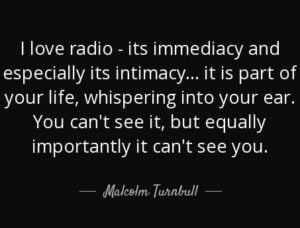One of the more underappreciated skills in radio is the ability of an on-air host to connect on a 1 on 1 level with a listener. Some think that a connection is the result of providing passion, opinion, knowledge and entertainment, and choosing the right topics to discuss. Although those items factor into a radio show’s success, there’s one other small detail that often gets overlooked – speaking to one set of ears at a time!
Turn on a local sports radio station today and chances are you’ll hear a number of hosts refer to the audience as “everyone”, “all of you”, “ladies and gentlemen”, or “the fine people of (name your city)”. But when a person tunes into a sports talk show, they do so while in the comfort of their car, home, or job. In most cases they listen without anyone else nearby.

To the individual, you’re a companion providing a mental distraction while they travel to or from work. Depending on that person’s job and your show’s level of importance, they may even listen during their workday. The host can see the texts, tweets, Facebook replies, and phone calls that pour in, but those who interact are unaware and uninterested in who else is reaching out. They simply want to ask a question or offer an opinion, be acknowledged on a personal level by the host, and then listen for the response.
When we talk to our audience, we must remember that we’re making one hundred thousand individual connections, not speaking to a stadium full of one hundred thousand people. One of the most powerful words you can use on the air to address the audience and re-set your subject is ‘YOU’. It helps steer the conversation in a more personal direction, and if you insert that word in place of the other options, you’ll find your listeners feel much closer to you.
 One person who shares this belief is Dan Zampillo. During his career, he’s programmed in New York (SiriusXM), Detroit (97.1 The Ticket), Washington DC (ESPN 980), Columbus (97.1 The Fan) and Chicago (APD at WGN and 670 The Score) so he’s worked with some of the best personalities in many of America’s top sports radio markets.
One person who shares this belief is Dan Zampillo. During his career, he’s programmed in New York (SiriusXM), Detroit (97.1 The Ticket), Washington DC (ESPN 980), Columbus (97.1 The Fan) and Chicago (APD at WGN and 670 The Score) so he’s worked with some of the best personalities in many of America’s top sports radio markets.
When I connected with Dan and discussed the possibility of writing a piece for the website, I knew he’d put something together that would be thought provoking. Dan pays attention to the details and understands their value, and I think his explanations and solutions make a lot of sense and can be very beneficial to on-air talent, producers, and programmers alike.
If you’d like to reach him to discuss the article, follow him on Twitter by clicking here or on Facebook by clicking here. When doing so, make sure to wish him a happy birthday. Today’s his big day. Now without further delay, here’s a look at the lack of intimacy in sports talk radio.
The Lack of Intimacy In Sports Talk Radio by Dan Zampillo
Are you afraid of intimacy?
Are you wondering why a radio programmer is prying into your personal life?
 Relax. That’s not my intent. Instead, I want to draw attention to an issue in our industry that I think is hurting our ability to connect with listeners: a lack of intimacy.
Relax. That’s not my intent. Instead, I want to draw attention to an issue in our industry that I think is hurting our ability to connect with listeners: a lack of intimacy.
Failing to talk to our listeners in an intimate way prevents us from establishing a strong relationship with them. It’s this strong relationship that is absolutely critical for developing and growing listeners, particularly now when there is so much competition for ears. Podcasts, webcasts and other digital broadcasts are popular in part because they have embraced the art of intimacy, making our ability to gain audience share more and more difficult.
So, what can we do?
One thing I have told my talent is to recognize that it’s a rare occasion when a station or host can stand on the top of the mountain and preach to the masses. It’s much more powerful to go out to those masses and engage with them one on one. Here are three ways I’ve tried to embrace intimacy on the radio and create an emotional and lasting connection with listeners:
Talk To One Person
All too often I hear radio hosts welcome “everybody” to their show. Or, they start out with the phrase “HELLO, AMERICA!”
 Here’s the issue with this: I am not “everybody.” I am not “America.” I am one person who is sitting in my car listening to a radio station, hoping to connect to the content and personality who is talking to me.
Here’s the issue with this: I am not “everybody.” I am not “America.” I am one person who is sitting in my car listening to a radio station, hoping to connect to the content and personality who is talking to me.
I’ve learned that one easy way of building intimacy is by talking to our audience like we are talking to one individual person. Phrases like “How do you feel?” or “What do you think?” can be more personal than “What does everyone think?” or “How do all of you feel about this?” Speaking directly to your listener makes them feel important and valued. The more important and valued they feel, the longer they’ll stay with you and the more often they’ll come back.
Use Theatrics
Intimacy can take many forms in real life, and the same is true for radio. I’ve tried to create an environment that encourages creating intimacy by presenting content in a variety of ways: loudly or softly, fast or slowly, seriously or in a goofy way. The key here is to have talent use all the tools at their disposal to help the audience feel closer to them.
 The best personalities think about how they can present a topic and talk to their audience in a way that will elicit the most emotional response. This means giving strong consideration to the theatrics of their presentation. They’re silly if they need to be. They’re soft if it more easily gets their point across. They’re angry if that’s the best way to drive the point home. Great talent do all of these things, knowing it will drive audience engagement and ultimately forge a deeper bond.
The best personalities think about how they can present a topic and talk to their audience in a way that will elicit the most emotional response. This means giving strong consideration to the theatrics of their presentation. They’re silly if they need to be. They’re soft if it more easily gets their point across. They’re angry if that’s the best way to drive the point home. Great talent do all of these things, knowing it will drive audience engagement and ultimately forge a deeper bond.
Don’t Overlook Station Imaging
I’m convinced the messages we send the audience via our station imaging should reflect the idea of establishing closeness. In other words, I’d argue that intimacy should be cultivated not only by the hosts and through their shows, but also through the promos that surround them.
 Here’s how I like to do this: I tell the audience that they can get closer to the things that matter most to them. Then, I tell them how we’re going to accomplish this.
Here’s how I like to do this: I tell the audience that they can get closer to the things that matter most to them. Then, I tell them how we’re going to accomplish this.
For example, if listeners value their football team above all else, then the station promos should acknowledge this and tell them what coverage is offered as it relates to their team—such as when the beat reporter’s daily team updates are and what kind of information to expect from them.
Likewise, if listeners feel a connection to a particular host, then show promos should accentuate that host’s personality and strive to provoke an emotional response from listeners. I’ve found that the more direct and specific we can be about the value proposition of listening to a particular segment or show, the better chance we’ll have that they’ll keep coming back.
I believe in radio, and I believe that no matter how it is consumed, it will continue to be an important part of people’s lives. But I’m afraid that if we continue to scrub out the intimacy, we are opening the door for our competitors to win over our audience. So I’ll rephrase my original question: Are you ready to embrace intimacy? The future of our business might depend on it.






